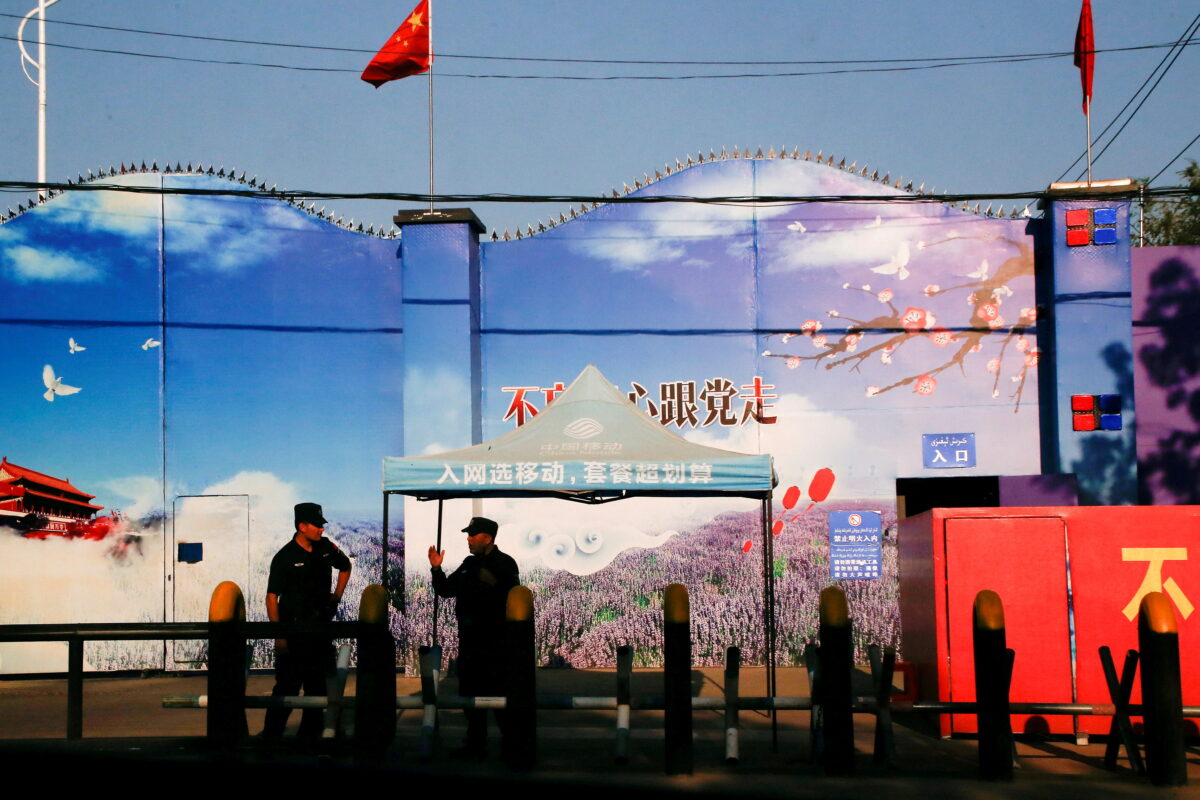
Security guards stand at the gates of what is officially known as a vocational skills education center in Xinjiang’s Huocheng county in China on Sept. 3, 2018. (Reuters/Thomas Peter/File Photo)
By
China’s state-sanctioned religious bodies have been made to speak in favor of communist policies, as the regime becomes “increasingly hostile” toward religious beliefs, a bipartisan U.S. federal government commission said.
“In 2021, religious freedom conditions in China deteriorated,” the U.S. Commission on International Religious Freedom (USCIRF) said in its 2022 annual report (pdf) released on April 25.
Findings show that Chinese authorities “continued to vigorously implement its ‘sinicization of religion’ policy and demand that religious groups and adherents support the Chinese Communist Party’s rule and ideology.”
“Throughout 2021, the State Administration for Religious Affairs … and other agencies issued new legal measures, imposing further restrictions on clergy, religious schools, and religious content on the internet,” the report states.
Over the past years, the communist regime has increased control over domestic religious affairs. It announced in March 2018 that it would place the religious affairs bureau directly under the Chinese Communist Party’s (CCP’s) United Front Work Department—the agency responsible for running political influence operations both at home and overseas, with a focus on managing potential opposition groups.
Chinese leader Xi Jinping in December called state-controlled religious groups in China the ties between the Party and the believers, who should be “united around the Party.”
On March 25, 2021, the state-run Chinese Patriotic Catholic Association, which isn’t recognized by the Vatican, held a lecture on the history of the CCP. Last April, Buddhist and Taoist temples in many provinces sent their monks to visit the tombstones and gravesites of communist martyrs and pledge allegiance to the Party.
“Local authorities organized seminars to indoctrinate monks and nuns at Tibetan Buddhist monasteries, [and] restricted Tibetans’ access to temples with a heavy security presence,” the report reads. They “destroyed sites and symbols of religious significance, and detained and punished Tibetans for listening to the Dalai Lama’s teachings or possessing his portrait.”
While the regime further tightened its monitoring of domestic religious affairs, those beyond its control became targets for persecution, including independent spiritual communities and whoever has run afoul of the Party.
According to the report, adherents of groups such as underground Catholics, house church Protestants, Uyghurs and other Muslims, Tibetan Buddhists, and Falun Gong practitioners “are especially vulnerable to persecution.” Researchers said the regime continued to harass and jail Catholic priests who refused to join the state-controlled Catholic association.
“At least 101 [Falun Gong] practitioners died as a result of government persecution” in 2021, the report said, citing Minghui.org, a U.S.-based clearinghouse that collects firsthand evidence of the CCP’s persecution of the peaceful qigong practice.
More than 892 adherents of the spiritual practice, also known as Falun Dafa, were also sentenced to prison as a result of the state’s persecution.
Falun Gong, originating in northeastern China in 1992, features five slow-moving qigong exercises and moral teachings based on the tenets of truthfulness, compassion, and tolerance. It gained significant popularity during the 1990s, with up to an estimated 100 million people practicing by 1999. Perceiving this to be a threat to its authoritarian rule, the CCP launched a sweeping persecution of the practice, one that has been ongoing for almost 23 years.
The report also detailed abuses in the far west Xinjiang region, such as physical and psychological torture, rape and other forms of sexual violence, forced labor, forced sterilization, and abortion while in custody, citing former detainees and witnesses. Moreover, authorities separated as many as 880,000 Muslim children from their parents.
Besides Beijing, Moscow also continued to employ “an array of problematic legislation” to persecute religious minorities, the report said, including Muslims, Protestants, members of the Orthodox Church of Ukraine, Falun Gong practitioners, and adherents of indigenous religions.
The report also noted USCIRF recommendations to be implemented by the U.S. government—including the designation of Russia as a country of particular concern, sanctions on religious freedom violators, and genocide determinations for atrocities perpetrated by China and military-ruled Burma, also known as Myanmar.
“Moving forward, the United States should take additional steps to support freedom of religion or belief around the world,” USCIRF Vice Chair Nury Turkel said in a statement.